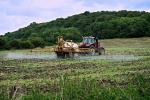Operational Group: Alternatives for the control of food-risk weeds
- Type Operational group
- Execution 2020 -2022
- Assigned Budget 1.513.726,00 €
- Scope Supraautonómico
- Autonomous community Andalucía; Castilla y León; Castilla - La Mancha; Murcia, Región de; Navarra, Comunidad Foral de; País Vasco; Rioja, La
- Main source of financing CAP 2014-2020
Currently, field control of weeds that pose a risk to foodborne illness (Datura stramonium L., Solanum nigrum L., Xanthium spp.) is primarily addressed through the use of herbicides, which are complemented in isolation by other strategies. However, this approach is insufficient, as contamination of these plants (or parts of them) in processed plant products continues, with the resulting risk for consumers and producers.
From a regulatory perspective, it is worth noting the European push for the sustainable use of plant protection products, reducing their risks and effects on human health and the environment, and the promotion of Integrated Pest Management and alternative methods and techniques, such as non-chemical control methods, regulated by Directive 2009/128/EC. At the Spanish level, this has materialized through an initial National Action Plan 2013-2017, which is currently being continued in the National Action Plan 2018-2022, which sets quantitative objectives, goals, measures, indicators, and timelines.
Regarding the specific regulations relating to weeds that pose a risk to food, it should be noted that in 2015, the European Commission published Recommendation EU 2015/976 of 19 June 2015 on the monitoring of the presence of tropane alkaloids in food, requesting Member States to monitor the presence of these compounds in certain foods.
This Task Force aims to develop and promote integrated cultivation practices, alternatives to the current use of pesticides, that control the proliferation of weeds that pose a risk to food safety. Its activities include: - Evaluating incidence levels and identifying critical points. - Identifying the best alternatives. - Designing and drafting the Innovation Project. - Dissemination.
- Coordinator/entity name: Benito Jiménez Cambra (948830563)
- Coordinator/entity email: mariz@congeladosnavarra.com
- CONGELADOS DE NAVARRA, S.A.U.
- GELAGRI IBÉRICA, S.L.
- IBERFRESCO FRESH PRODUCT COMPANY, S.L.
- ASOCIACIÓN ESPAÑOLA DE FABRICANTES DE VEGETALES CONGELADOS (ASEVEC)
- INSTITUTO NAVARRO DE TECNOLOGÍAS E INFRAESTRUCTURAS AGROALIMENTARIAS, S.L. (INTIA)
- CENTRO NACIONAL DE TECNOLOGÍA Y SEGURIDAD ALIMENTARIA (CNTA-Laboratorio del Ebro
- SERVICIOS INTEGRALES LASKER, S.L.
- SMARTRURAL, S.L.L.







